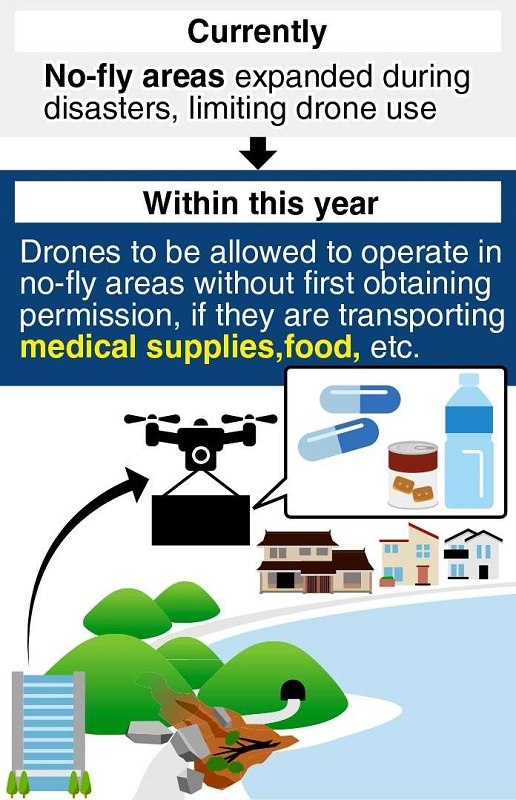Japan Eyes Greater Use of Drones Amid Disasters; Permission Would Not Be Needed to Convey Supplies to No-Fly Zones

Training for coordination between a manned helicopter and a drone is conducted in Hokkaido in October.
7:00 JST, May 30, 2024
The government is making final arrangements to expand the use of drones in times of disaster, hoping to allow them to transport relief supplies in no-fly areas without the need to obtain official permission.
The Council for Promotion of Regulatory Reform is expected to include deregulation measures to that effect in a draft to be compiled by Friday. The measures will then be included in the Regulatory Reform Implementation Plan that will be decided by the Cabinet in June.
In addition to standard no-fly zones such as dense residential areas, the Civil Aeronautics Law expands the areas where drone flights are prohibited in the event of a disaster, so as not to interfere with helicopters conducting search and rescue operations. Currently, the Land, Infrastructure, Transport and Tourism Ministry’s permission is required to operate drones in no-fly areas, but such permission is unnecessary when drone flights are requested by prefectural police or municipalities.
The Noto Peninsula earthquake on Jan. 1 cut off roads, which prevented rescuers and supplies from reaching isolated communities. Although drones were used to assess the damage through aerial photography, their role in transporting relief supplies was limited.

Possible drone use at time of disaster
Based on requests from affected areas, the draft calls for the transport ministry to clarify that drones can be operated without permission in no-fly zones when transporting medical supplies, food and other necessary items. The draft would encourage the use of drones to swiftly deliver supplies to disaster victims.
The draft will also include measures to support startups. It proposes revising the criteria to certify articles of incorporation ― a procedure required to incorporate stock companies ― so that the fee for the certification of startups will be approximately halved. The current minimum fee is ¥30,000.
The draft likewise proposed the simplification, within this fiscal year, of the process from the submission of drafted articles of incorporation through to a company’s official registration, which makes its establishment. The changes would allow this process to be completed within 72 hours, or within just 24 hours if the Digital Agency’s “one-stop service for incorporation” system was used.
Regarding the shared-ride services that started in April, the draft will propose improvements to cope with the high demand expected at times of rainy weather and big events. However, it has not been decided whether to expand service providers, which currently are limited to taxi companies.
Top Articles in Politics
-

Japan PM Takaichi’s Cabinet Resigns en Masse
-

Sanae Takaichi Elected Prime Minister of Japan; Keeps All Cabinet Appointees from Previous Term
-

Japan’s Govt to Submit Road Map for Growth Strategy in March, PM Takaichi to Announce in Upcoming Policy Speech
-

LDP Wins Historic Landslide Victory
-

LDP Wins Landslide Victory, Secures Single-party Majority; Ruling Coalition with JIP Poised to Secure Over 300 seats (UPDATE 1)
JN ACCESS RANKING
-

Producer Behind Pop Group XG Arrested for Cocaine Possession
-

Japan PM Takaichi’s Cabinet Resigns en Masse
-

Man Infected with Measles Reportedly Dined at Restaurant in Tokyo Station
-

Israeli Ambassador to Japan Speaks about Japan’s Role in the Reconstruction of Gaza
-

Videos Plagiarized, Reposted with False Subtitles Claiming ‘Ryukyu Belongs to China’; Anti-China False Information Also Posted in Japan


























